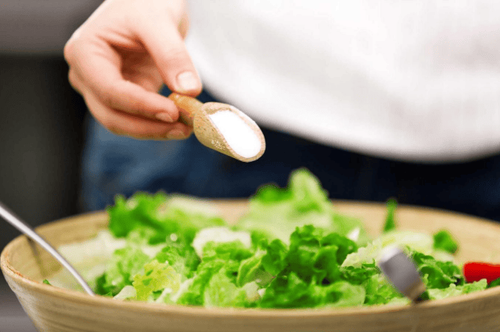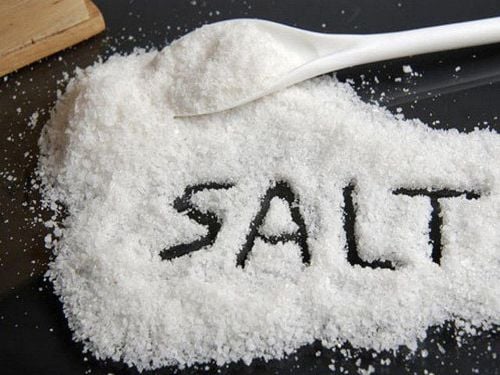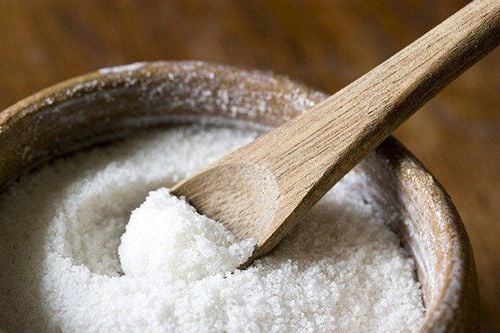This is an automatically translated article.
The article is professionally consulted by Master, Doctor Nguyen Thi Nhat - Infectious Specialist - Department of Medical Examination & Internal Medicine - Vinmec Hai Phong International General Hospital5 grams of salt / day is the maximum amount of salt we are allowed to eat into the body each day. If you take too much, it will cause dehydration, more severe can lead to convulsions, coma, serious health effects over time.
1. What are the signs of excess salt in the body?
Here are the 5 most obvious signs that the body is too salty
1.1 Always feel thirsty The sodium in salt will help balance the fluids in the body. However, when consuming too much salt will make the body need to add more water to excrete the salt. This is why every time you eat salty food, you often feel thirsty faster than usual.
1.2 Bone pain It is the excess salt in the body that causes a significant influence on the development of bones. When you consume too much salt, the kidneys will not be able to eliminate all the toxins out, leading to calcium deficiency. Severe lack of calcium will make bones gradually weaken, dental condition is also affected and cause osteoporosis later on.
1.3 Persistent headaches Too much sodium from salt entering the body will increase blood volume, which in turn causes varicose veins and increases the risk of blood pressure disease. This is the cause of severe headaches, affecting daily activities.
1.4 Swollen, edematous body If you wake up in the morning and find your eyes are puffy, your feet suddenly swell, or you experience cramps... then this reflects that your body is in excess. too much salt. Because the body will automatically store water when the amount of salt in the body is high, some people will experience an unusually heavy and swollen body. Just pay attention to balance the daily diet, avoiding salty foods will help eliminate excess salt.
1.5 Changes in excretory process Accumulation of sodium in the body can lead to abnormal changes in the excretion process as follows:
Urinating more: Because the kidneys have to work harder to excrete salt from the body body. Dark yellow urine: The body contains too much sodium will cause dehydration, and if not provided with water in time can lead to dark yellow urine.
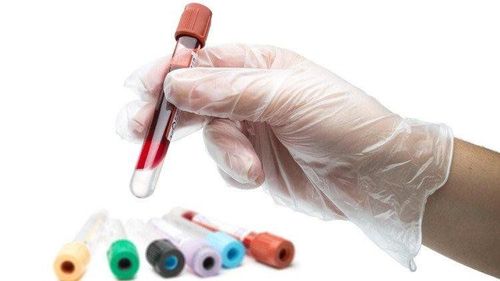
Trắc nghiệm: Muối trong thực phẩm, natri, huyết áp và sức khỏe của bạn
Muối, natri là chất khoáng cần thiết cho cơ thể để duy trì hoạt động ổn định. Tuy nhiên, chế độ ăn thừa muối có nguy cơ cao dẫn tới các vấn đề sức khỏe nghiêm trọng. Cùng làm bài trắc nghiệm sau đây để hiểu hơn về những ảnh hưởng của các khoáng chất này tới huyết áp và sức khỏe bạn thế nào nhé.
Nguồn tham khảo: webmd.com
2. How to determine the amount of salt in the daily diet
World Health Organization WHO recommends, each person should only use 5g of salt / person / day, equivalent to about a teaspoon of salt per day. The American Heart Association makes a more cautious recommendation of 1.5 grams of sodium per day, especially for people at risk for heart disease.
Particularly in controlling blood pressure in hypertensive people, the World Health Organization has made recommendations to limit the amount of salt in the body. Accordingly, each day people with high blood pressure should only consume less than 2.3 grams of salt/adult (one teaspoon of table salt) will help reduce blood pressure by 2-8 mmHg.
The amount of salt is loaded into the body through the diet each day, so each person can calculate it accordingly. Statistics in some familiar salt-containing foods and spices are as follows:
Natural foods in daily meals have about 400mg of sodium (equivalent to 1g of salt). Seafood will have a higher salt content than other natural foods. Salt is abundant in salty spices such as: 1g of salt contains 400mg of sodium, 1g of seasoning seeds contains about 200mg of sodium, 1g of monosodium glutamate has 130mg of sodium, 1ml of fish sauce contains 77mg of sodium, 1ml of soy sauce has 56mg of sodium. 1 tablespoon of fish sauce (8ml spoon, used for pho) has about 1.5g of salt 1 tablespoon of soy sauce (8ml spoon, used for pho) has about 1.1g of salt 1 teaspoon of horizontal salt (spoon type) 5ml) has about 4g of salt 1 tablespoon of yogurt with 1g of salt In instant noodles there is an average of 4.3g of salt/pack, including 2.5g in the seasoning packet and the rest in the noodles.
3. How to reduce the amount of salt consumed each day?
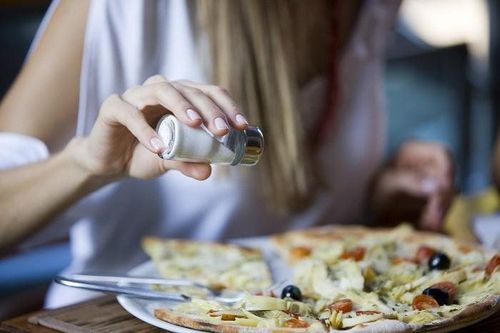
It is estimated that each Vietnamese person is eating about 10g of salt per day and eating salty foods is increasing many diseases, the most significant of which is cardiovascular disease and hypertension. This amount of salt is twice the recommended amount of salt recommended by the WHO, which is 5g of salt per day for an adult.
In which, the large amount of salt that Vietnamese people consume comes from the habit of salty cooking and eating salty foods. This is something we need to correct.
With the current taste of Vietnamese people, when processing food, it tastes bland, it will not exceed the need for salt. When seasoning is very rich, using a lot of spices and adding sauces, the amount of salt consumed will be very high.
If using instant noodles, you need to reduce the seasoning package so that you do not exceed the recommended sodium threshold.
Measures to reduce salt intake:
Increase intake of fresh foods Regularly eat boiled dishes Limit the intake of processed foods, which contain a lot of salt such as instant noodles, spring rolls, vegetables, salt, and chips Bim... Reduce braised, rimmed, roasted and pickled dishes , water of vermicelli, pho, vermicelli, especially when eating at restaurants When cooking, if you can combine spices such as pepper, chili, lemon... the dish will be more delicious without having to use a lot of salt . To avoid the use of foods with a lot of salt, people need to pay attention to check the amount of salt listed on food packaging for ready-to-eat foods, limit eating foods that use a lot of salt such as pickles, braised dishes, and cooking. Use less salt to replace the salty taste of salt.
Signs of excess salt in the body are quite faint, so each person needs to consciously implement a diet with a sufficient amount of salt every day, to protect the health of themselves and their families.
Please dial HOTLINE for more information or register for an appointment HERE. Download MyVinmec app to make appointments faster and to manage your bookings easily.






